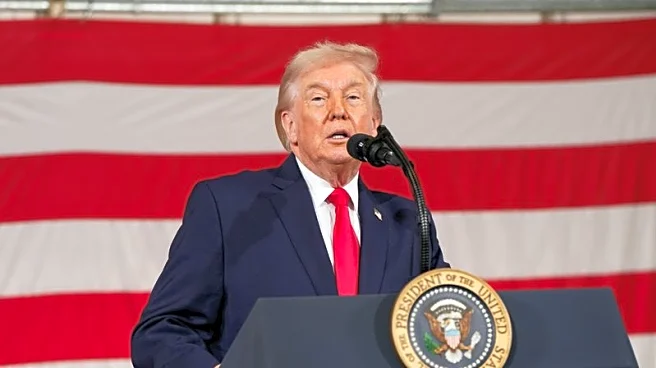What's Happening?
The recent meeting between President Trump and Democratic leaders in Congress failed to produce a funding agreement, resulting in a government shutdown. This has led to approximately 750,000 federal employees being furloughed without pay, while essential employees must continue working without immediate compensation. Historically, government shutdowns have a limited impact on the broader economy, with estimates suggesting a loss of around $7 billion per week. Despite the initial drop in S&P 500 and Nasdaq 100 futures, past shutdowns have shown that markets typically recover once the government reopens. However, prolonged budget standoffs could lead to more significant consequences, such as a downgrade of U.S. sovereign debt, affecting the dollar and Treasury bonds.
Why It's Important?
The shutdown's impact on federal employees and potential economic repercussions highlight the importance of resolving budget disputes promptly. While the immediate economic loss is relatively small compared to the overall U.S. economy, prolonged shutdowns could lead to more severe consequences, including a downgrade of U.S. credit ratings. This could destabilize financial markets and affect investor confidence. Additionally, if mass layoffs occur, the shutdown could transition from a political issue to a significant economic problem, affecting consumer spending and economic growth. The situation underscores the need for effective negotiation and compromise in government to prevent long-term economic damage.
What's Next?
If the budget impasse continues, ratings agencies may consider downgrading U.S. sovereign debt, which would have broader implications for financial markets. The political standoff over healthcare and immigration funding remains a central issue, with Democrats advocating for a clean budget and Republicans pushing for continued subsidies for social programs. The resolution of these disputes will be crucial in determining the duration of the shutdown and its impact on the economy. Stakeholders, including political leaders and financial markets, will be closely monitoring developments to assess potential risks and opportunities.
Beyond the Headlines
The shutdown raises questions about the political dynamics in Washington and the ability of leaders to navigate complex budgetary issues. It also highlights the vulnerability of federal employees who face financial uncertainty during these periods. The potential for a downgrade in U.S. credit ratings could have long-term implications for borrowing costs and fiscal policy. Additionally, the situation may influence public opinion on government effectiveness and the prioritization of spending on social programs versus fiscal responsibility.











